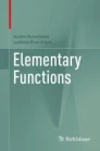- About MAA
- Membership
- MAA Publications
- Periodicals
- Blogs
- MAA Book Series
- MAA Press (an imprint of the AMS)
- MAA Notes
- MAA Reviews
- Mathematical Communication
- Information for Libraries
- Author Resources
- Advertise with MAA
- Meetings
- Competitions
- Programs
- Communities
- MAA Sections
- SIGMAA
- MAA Connect
- Students
- MAA Awards
- Awards Booklets
- Writing Awards
- Teaching Awards
- Service Awards
- Research Awards
- Lecture Awards
- Putnam Competition Individual and Team Winners
- D. E. Shaw Group AMC 8 Awards & Certificates
- Maryam Mirzakhani AMC 10 A Awards & Certificates
- Two Sigma AMC 10 B Awards & Certificates
- Jane Street AMC 12 A Awards & Certificates
- Akamai AMC 12 B Awards & Certificates
- High School Teachers
- News
You are here
Elementary Functions

Publisher:
Birkhäuser
Publication Date:
2023
Number of Pages:
496
Format:
Paperback
Price:
59.99
ISBN:
978-3031290749
Category:
Textbook
[Reviewed by , on ]
Frederic Morneau-Guérin
03/29/2024
The book Elementary Functions by authors Andrei and Ludmila Bourchtein deals with pre-calculus topics related to elementary functions. Unlike many of the other books on the same subject, this one focuses on topics and techniques that were available before the introduction of the concept of limit, while maintaining a level of rigour appropriate for a university mathematics course.
To get the most out of this book, the only prerequisite is a mastery of the algebraic notions taught in a standard high school course. However, considering the rigorous mathematical approach and presentation that is sometimes a bit dense and therefore challenging for a novice, this book will be better suited for first-year university students wishing to build a solid foundation for the subsequent study of calculus and analysis than for high school students in their final year. As an introduction to mathematical reasoning and methods of proof in mathematical analysis, Andrei and Ludmila Bourchtein's proposal is neither the most accessible nor the most appropriate. On the other hand, it is one of the most systematic, explicit, and complete presentations of the properties of elementary functions that can be found in works that do not presume a mastery of calculus.
This book is almost 500 pages long and is divided into five chapters. In the first chapter of about fifty pages, some basic set concepts are introduced. Next, there is a successive discussion of the sets of rational and real numbers and their main properties. The second chapter, 160 pages long, is the heart of the book. It introduces the characterisation of the main properties of functions as well as the techniques for analysing elementary functions, on top of showing how these techniques can be used in practice. It covers symmetry (periodicity, evenness, oddness), boundedness, monotonicity, extrema, concavity, inflection, behaviour at infinity and convergence at infinity, horizontal and vertical asymptotes, injectivity and surjectivity, and finally, invertibility. Each of these concepts is illustrated (in an abundance of figures accompanied by a legend and sometimes with embedded explanations) and exemplified. The third chapter, totalling 140 pages, contains detailed, in-depth examples of applications of the properties considered in the second chapter. Polynomial, rational, and irrational functions are each considered in turn. A fourth chapter of just under 100 pages examines exponential, logarithmic and trigonometric functions. Finally, a short fifth chapter of just under 20 pages brings the book to a close, highlighting the importance of calculus and analysis with explanations and motivational examples. By revisiting some of the functions studied in the previous chapters, the reader can anticipate the connections between the first derivative and monotonicity and extrema, and the relationship between the second derivative and concavity as well as inflection. The reader is guided in their reflection by a series of judicious questions and clues.
What makes this book so special is the abundance of worked or partially worked examples, routine questions, and more difficult problems (some of which are marked with an asterisk and have a very high level of difficulty.)
Although the book includes an index listing the various concepts covered and the functions studied, it lacks a bibliography in the traditional sense of the term. At most, a short section entitled Remark on Bibliography refers to four popular works on the subject covered in this book, as well as four classic monographs recommended by the authors for further study of the more advanced techniques for investigating the functions outlined in the epilogue.
Frederic Morneau-Guérin is a professor in the Department of Education at Université TELUQ. He holds a Ph.D. in abstract harmonic analysis.
Frederic Morneau-Guérin is a professor in the Department of Education at Université TELUQ. He holds a Ph.D. in abstract harmonic analysis.
See the publisher's website.
- Log in to post comments




